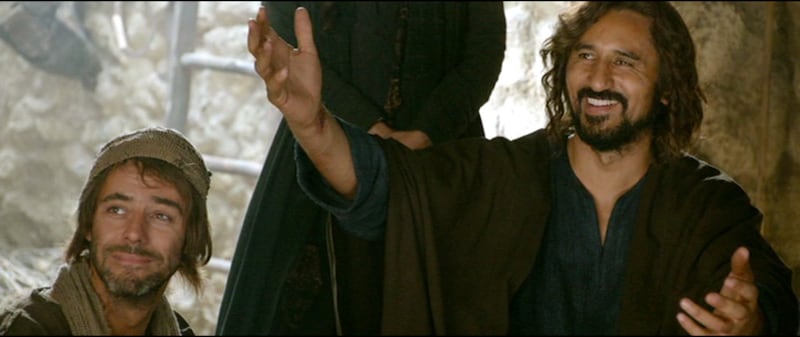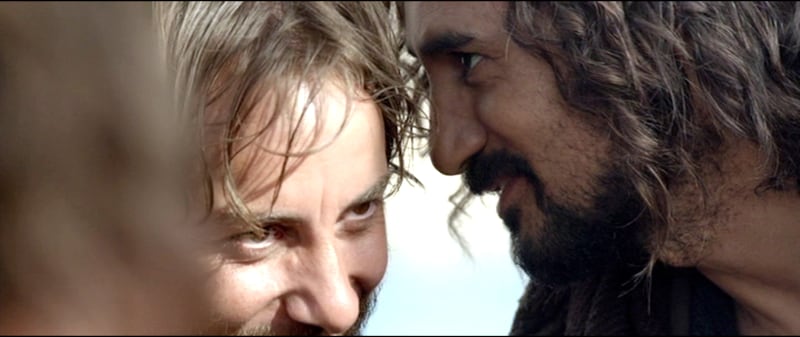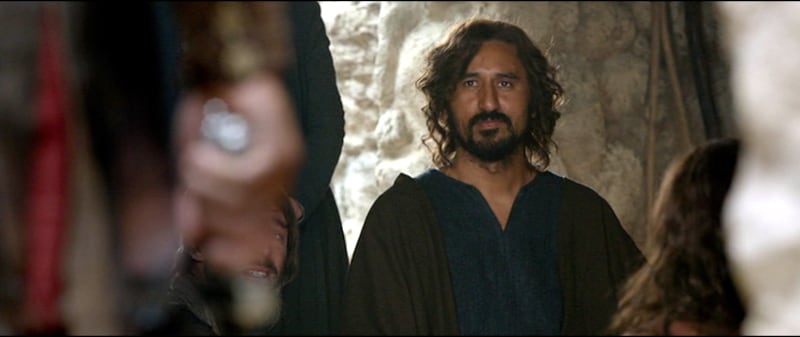
We often say, “I love Jesus.”
But how often do you hear, how often do you say, “I like Jesus”?
The two aren’t the same. And while the Bible gives us a lot of reason to love Jesus, it’s pretty thin in telling us why we should like him. I think both are important.
I’m not a priest or preacher or even a theologian. I’m just an ordinary sinner, burdened with my manifold sins and wickedness, just like most everybody else. And until a few years ago the whole idea of a personal relationship with Jesus was entirely abstract to me. How is it possible to have a relationship with someone about whom we know so little?
He has been portrayed in devotional films and productions as a kind of cipher at best, maybe even a bit of a stick in the mud, not unlike the scribes and the pharisees, just playing for the other team. Yet when Jesus approaches the men who would become his disciples, strong, rough fishermen He’s never met before, they’re willing to drop everything and abandon their lives to follow him. He sort of points a finger at a tax collector named Levi, motions him to come over . . . and he does it!
What’s going on here? Was Jesus as he is depicted in the old pictures, virtually glowing, with a gold halo above his head, possessed with otherworldly charm that beguiled those he chose as followers? That doesn’t seem right, does it.
It was impossible for me to reconcile. I spent a long time trying, with no success. I’d missed something that is, okay, not obvious, but in retrospection was right there all along, for anyone who wants to look for it.
My own little path to realization was sparked by a movie that came out in 2016. It’s called “Risen.” It’s the fictional account of a Roman tribune, Clavius, who was sent out to find the body of Jesus. (I’ll not argue the theology of the movie. It certainly bows here and there to the expediencies needed in film making. But there’s nothing there that the believer would much object to.)
What captivated me was the portrayal of Jesus. It didn’t take any liberties, but it did show Jesus entirely capable of drawing close friends, of instilling confidence in them, in gaining their following. Jesus who isn’t pedantic and stern. No, this portrayal of Jesus was different.

We see him making little private jokes with individual disciples. We don’t hear them, but it’s enough to inspire a view from a slightly different angle, and if we go back and look at the gospels we discover it is there. Jesus even gave nicknames to some of his disciples! James and John were wont to go off half cocked — and he called them the “sons of thunder.” It is always portrayed as a stern rebuke, but now I don’t think it was. I think he was making fun of them. I think the other apostles laughed. The two brothers may have gotten a little red-faced and embarrassed, but they probably laughed, too, and I’ll bet the lesson was just as effective.

Jesus, I think, was a likable guy and a good friend, and viewing things in that light many things we find in the Bible take on a new dimension. At the home of Martha and Mary, for instance, when Martha complained that Mary wasn’t helping out, Jesus replied with that day’s equivalent of “lighten up. We’re talking, okay?”
What especially moved me in “Risen” was the depiction of Jesus and the disciples as joyous. We talk a lot about joy, but it’s not something that exactly jumps out at you in the Bible, and I think many of us assume that joy is the part that comes later, in Heaven, while Jesus and the gang were all the time kind of gloomy and hangdog.
But no, not according to a scene that depicts the disciple Bartholomew being questioned by Clavius, Bartholomew practically explodes in delight over the resurrection: “It changes everything!” He’s laughing, almost jumping up and down. That scene was, to me, like the moment in the Wizard of Oz when Dorothy opens the door and the movie goes from black-and-white to color. It is joyous!
I don’t want to spoil the movie — if you haven’t seen it, you should, and if you have, you should see it again — but it comes to pass that Clavius and the apostles are together with Jesus in Galilee.
“Did you know he would arise?” asks Clavius.
“He said he would,” replies Bartholonew, thoughtfully, “but truth be told, we doubted.”
“Then what made you follow him?”

The pair’s conversation is interrupted by noise, of Galileans chasing a leper, hitting him with sticks and kicking him. Jesus rises, walks over, and talks to the man, now fallen in the dust. He gives him a fish from the apostles’ campfire, and embraces him, saying a few words we do not hear. The man rises and walks away and when he turns we see that he is healed.
Bartholomew, grinning and happy as always, turns to Clavius. “That’s why.”
I don’t mean to criticize the Bible. It can only contain so much, the things that have been deemed most important, the essentials. The things that were commonplace and would have been assumed two thousand years ago in Judea have gotten lost over the years and with them a lot of flavor and context. To some extent it’s like having us look at the perfectly accurate box score and rulebook and from those we have to envision a game of baseball. Those things are essential, to be sure, but not always enough.
So when I watched the movie “Risen,” I realized that the things that had grated and seemed alien to me might be explained, and that all of those writers, actors, and directors who have portrayed Jesus as a humorless youthful Gandalf character may have gotten it wrong. More than that, that loving Jesus as an act of the will isn’t all that’s available to us. Most important, that liking Jesus lets us view him in three dimensions.
We too easily see our Savior as going around all the time making pronouncements as if He were some hack politician trying to get a sound bite on the evening news, because that’s how He’s almost always shown. I think that such a representation is wrong. His remark that He had come not for the healthy but for the sick can be taken in several ways. The literal one, of course, but also in the way that says “well, clearly, you don’t think you have any room for improvement.” Not a grand pronouncement but instead a little snub of those who were all self-righteous and full of themselves. He didn’t call them sons of thunder, but I bet He did have a name for them and I bet it made the disciples laugh.
Billy Joel famously wrote the lines, “I’d rather laugh with the sinners than cry with the saints. The sinners have much more fun.” Father, now Bishop, Robert Barron used to preach — and he may still, I don’t think he changed his mind — that “Jesus likes sinners.” Not their sins, but them.

Once we look at it from that perspective, it becomes a lot easier to see Jesus during His agony in the garden. He didn’t go there to tell the Father to sweep up all the sins of the world and put them on His tab. No, He assumed the guilt, the real, genuine anguished guilt, and pain, and regret, for every sin ever committed and every sin that would ever be committed. It tells us a lot if we consider that He was doing it for people He likes.
So yes, by all means we should celebrate this season when we especially remember the death of the one who died in expiation of our sins. Our anguish, though, should be over our own waywardness, and just this once we might consider it with the idea that we have let down a friend. Someone who likes us. I imagine we all know how that feels, to let someone down or to be let down.
Our path will become clearer when we consider Jesus as someone we should get to know enough not just to love, but also to like.
For me, a little 2016 movie did that.

Dennis E. Powell is crackpot-at-large at Open for Business. Powell was a reporter in New York and elsewhere before moving to Ohio, where he has (mostly) recovered. You can reach him at dep@drippingwithirony.com.
You need to be logged in if you wish to comment on this article. Sign in or sign up here.
Join the Conversation
Re: What a Friend We Have in Jesus
“Our path will become clearer when we consider Jesus as someone we should get to know enough not just to love, but also to like.”…Dennis E. Powell It sure helps when we realize that he is our friend in all things. Happy, sad…mad. In it all. Thank you, Mr. Powell for a lovely article.